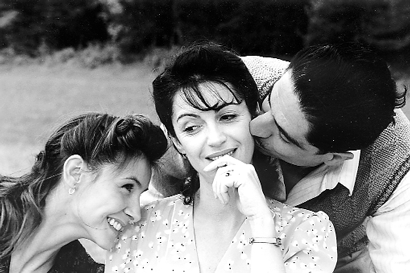Jews in Paris’ garment district struggle to define their liberty in 1946
“We had to invent the direction of the film, because the book is a succession of little stories that make up one big story. For example, the end of the movie is a big party on the grass. In the book that’s told in a series of letters. We made a whole sequence of it.”
Yes, and an exquisite, heart-stopping sequence indeed, evocative of the last great shot in Bergman’s “Wild Strawberries,” the circus roundup in Fellini’s “8 1/2,” the entirety of Jean Renoir’s “Picnic on the Grass” and of course the progenitor of them all, Manet’s “Le Dejeuner sur l’Herbe.”
“Thank you,” Deville said. “But when I make a film, I don’t think of all those others.”
Deville is the son of a man who had a small factory of five or six workers “building flower pots—a small factory not unlike the tailoring workshop of Monsieur Albert, one gathers. Maman took care “of the financing and the delivery.”
In 1942 the English bombed the environs of Saint Cloud, which had a Renault factory; in 1943 the Americans did the same. At one point in the film, Albert responds, with a shrug, to Andree’s sob story about being forced to walk naked through town for sleeping with a German soldier: “We all had our war.”
Said Michel Deville: “I don’t think you really direct actors, unless you have a vocation as a military commander or a mentor. I think you choose actors, just as they choose you,” Michel Deville said. “That indeed means that I do not direct them but rather that they take me somewhere and thrill me.”
Low-key can be thrilling too. “Almost Peaceful” is proof of that.
We also publish:
ADVERTISING



































